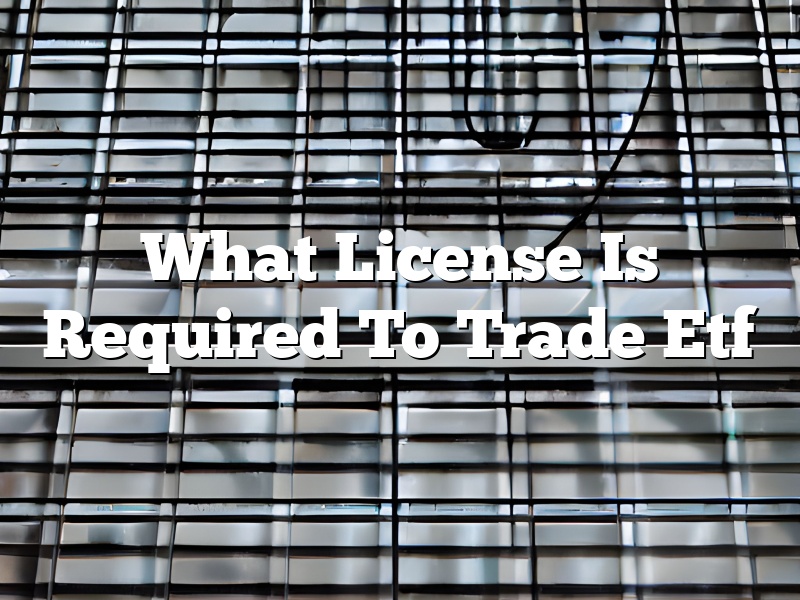What License Is Required To Trade Etf
When it comes to trading, there are a variety of licenses traders need to be aware of. Depending on the type of trading being done, different licenses may be required. For example, when trading stocks, a securities license may be needed.
When trading ETFs, a license is not always required. In most cases, no license is needed to buy and sell ETFs. However, there are a few exceptions. For example, if the ETF is being traded on a foreign exchange, a license may be required.
If you are unsure whether or not a license is needed to trade ETFs, it is best to check with your local securities regulator.
Contents
Do you need a Series 7 to trade ETFs?
A Series 7 license is not required to trade ETFs, but it is required to trade other types of securities. An ETF is a security, but it is traded on an exchange like a stock. Therefore, an ETF can be bought and sold without a Series 7 license.
What is a Series 6 and 63 license?
A Series 6 license is a securities license that allows the holder to sell mutual funds and variable annuities. A Series 63 license is a securities license that allows the holder to sell securities in a retail setting.
Can anyone start an ETF?
An exchange-traded fund, or ETF, is a type of investment fund that trades on a stock exchange. ETFs are similar to mutual funds, but they are bought and sold like stocks.
ETFs have become increasingly popular in recent years, as they offer investors a way to gain exposure to a wide range of assets, including stocks, bonds, and commodities.
But can anyone start an ETF? The answer is yes, but there are a few things you need to know first.
In order to start an ETF, you need to be registered as a broker-dealer with the Securities and Exchange Commission, or SEC. You also need to have a registered investment adviser, or RIA, on board to help you with the day-to-day management of the fund.
Additionally, you’ll need to have a custodian bank to hold the assets in the ETF. The custodian bank is responsible for safeguarding the assets and ensuring that they are properly accounted for.
Finally, you’ll need to file a Form 8-K with the SEC when the ETF is first launched. This document provides information about the ETF, including the ticker symbol, the name of the fund, and the description of the underlying assets.
So, can anyone start an ETF? The answer is yes, but there are a few things you need to know first. If you’re interested in starting an ETF, be sure to consult with a registered broker-dealer and investment adviser.
What is a Series 26 license used for?
The Series 26 license is a securities license that is used by individuals who want to work in the securities industry. This license allows individuals to sell, trade, and act as an agent or representative for securities products. In order to qualify for this license, individuals must pass a securities exam.
Can you sell ETFs with a Series 6 license?
Yes, you can sell ETFs with a Series 6 license. An ETF, or exchange-traded fund, is a type of investment fund that holds a collection of assets and divides them into shares. These shares can be traded on a stock exchange, just like regular stocks.
A Series 6 license allows you to sell all types of securities, including ETFs. To become licensed, you must pass a securities exam administered by the Financial Industry Regulatory Authority (FINRA).
If you’re interested in becoming a licensed broker and selling ETFs, it’s important to understand the different types of ETFs available. There are a variety of ETFs available, including equity ETFs, fixed-income ETFs, and commodity ETFs. It’s important to understand the risks and rewards associated with each type of ETF before investing.
If you’re ready to start selling ETFs, a Series 6 license is your best option. With a Series 6 license, you can sell a variety of securities, including ETFs. To learn more about the Series 6 license and how to get started, visit FINRA’s website.
What is a Series 7 and 63 license?
A Series 7 license is a securities license that allows the license holder to sell and trade securities. A Series 63 license is a securities license that allows the license holder to solicit orders for securities transactions from the public.
Who needs a Series 7 or 63?
Who Needs a Series 7 or 63?
A Series 7 license is required to sell securities, while a Series 63 license allows the sale of securities and commodities. Most people working in the securities industry need to have one or both of these licenses.
The Series 7 license is more common, and is required for those who want to sell stocks, bonds, and mutual funds. It is also required for financial advisers who provide investment advice to their clients. The Series 63 license is less common, but is required for those who want to sell commodities and futures.
Some employers will only hire employees who have a Series 7 or Series 63 license. Others will accept employees who are in the process of obtaining one of these licenses.
There are several exams that must be passed in order to obtain a Series 7 or Series 63 license. The Series 7 exam has six parts, while the Series 63 exam has four parts. The exams can be taken at a local testing center.
The Series 7 and Series 63 licenses are valid for two years. To renew a license, the individual must complete a certain number of continuing education credits.
Obtaining a Series 7 or Series 63 license can open up many opportunities for those who work in the securities industry. It can also lead to a career in financial advising.






0